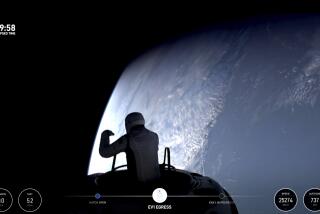Boeing enters space tourism partnership
Astronauts and space tourists could one day be sharing an armrest as they hurtle toward outer space under an agreement announced Wednesday between aerospace giant Boeing Co. and a private spaceflight marketing firm.
Under the deal, Space Adventures of Vienna, Va., will market passenger seats aboard the seven-person spaceship that Boeing is developing in Huntington Beach. It is designed to fly atop a variety of launch vehicles and is expected to be ready to go by 2015.
The spaceship, dubbed the Crew Space Transportation-100, is considered a contender for the job of ferrying astronauts to and from the International Space Station after the space shuttle program ends in 2011. If NASA chooses Boeing’s spaceship for the job, Space Adventures will sell the open seats on the flights to people who can afford what will probably be an out-of-this-world price.
“This opportunity to provide transportation services to NASA creates another opportunity to jump-start the human migration to space,” said Brewster Shaw, vice president and general manager of Boeing’s Space Exploration division. “One of our stated goals in our division is to become the Boeing commercial aircraft of human space commerce.”
Space Adventures has organized trips to the International Space Station for space enthusiasts on a three-person Soyuz rocket owned by the Russian government. Its first client was Dennis A. Tito, a California multimillionaire who founded Wilshire Associates Inc., an investment firm in Santa Monica.
In 2001, Tito was the world’s first space tourist, shelling out $20 million for the ride. Tito, who was 60 at the time, spent eight days in the International Space Station with two cosmonauts.
“I’m delighted to see Boeing jump into this,” Tito said. “Having experienced this myself, I know that once the cost comes down, there will be a lot of people lining up to travel to space. For me, it was worth every penny.”
Canadian billionaire Guy Laliberte, founder of Cirque du Soleil, spent about $40 million on Space Adventure’s last passenger trip in October 2009, said Eric Anderson, the company’s co-founder and chairman.
Boeing and Space Adventures wouldn’t say how much trips aboard the Boeing spacecraft would cost, but Anderson said it would be “tens of millions of dollars.” Taking civilian passengers would reduce the cost to NASA for those missions.
Announcement of the deal comes several months after President Obama’s call to reshape NASA and scrap plans for sending astronauts back to the moon. The U.S. will end human spaceflight for many years when the last space shuttle launches next year and the fleet is retired after three decades. Then, NASA will be dependent entirely on Russian launch vehicles to reach the International Space Station.
The president’s plan includes relying on private businesses for space missions, such as carrying cargo to the space station. The administration hopes that one day the companies will be able to take astronauts into space as well.
Modern-day industrialists have pounced on this opportunity, developing rockets and space capsules to assume the responsibilities. Private space entrepreneurs have been self-funding their businesses. Among them is Elon Musk, the multimillionaire who poured most of his personal fortune into a rocket venture called Space Exploration Technologies Corp., or SpaceX, based in Hawthorne.
NASA has helped some of these companies financially. It is set to invest $5 billion over the next five years to aid the companies in developing technology. For example, the design for the Boeing space capsule is funded under an $18-million contract with the space agency.
“We couldn’t be able to close our business case without funding from NASA to assist our development,” said John Elbon, program manager of Boeing’s commercial crew transportation system.
Nationwide, about 80 to 100 people are busy developing the space capsule. About half the workforce is at Boeing’s Phantom Works facility in Huntington Beach, manufacturing the capsule’s pressure vessel, base heat shield and autonomous docking systems.
The Chicago company hopes to have a crewless test flight by 2014 and be fully operational in 2015.
Until now, the commercial space industry has been dominated by small upstart companies, said Marco Caceres, senior space analyst for Teal Group Corp. Boeing’s entry could be a sign that larger companies see an opportunity for profits.
“It’s obvious that Boeing doesn’t want to be left behind in this market,” Caceres said. “Whenever you see a company of their size jump in, it catches the eye of the business community and investors. So, from an awareness standpoint, it’s great for a young industry.”
More to Read
Inside the business of entertainment
The Wide Shot brings you news, analysis and insights on everything from streaming wars to production — and what it all means for the future.
You may occasionally receive promotional content from the Los Angeles Times.











